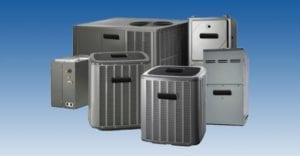
What Size HVAC Unit Should You Get For Your Home
Homeowners often grapple with choosing the right size heating, ventilation, and air conditioning (HVAC) system for their homes. This decision is crucial as it directly affects your comfort, energy efficiency, and ultimately, your utility bills. At 5Estimates.com, we help you navigate through this challenging process by connecting you to reputable HVAC companies and providing expert advice. This article will guide you on how to figure out what size HVAC unit you need, explaining different unit sizes, the possibility of using multiple units, and a look at mini-split HVAC systems.
COMPARE QUOTESUnderstanding HVAC Unit Sizes
HVAC systems are typically measured in tons, but not in the traditional sense of weight. Instead, one ‘ton’ in HVAC parlance refers to the system’s capacity to cool 12,000 BTUs (British Thermal Units) per hour. Standard residential HVAC units range from 1 to 5 tons, corresponding to a cooling capacity of 12,000 to 60,000 BTUs per hour.
A 1-2 ton system might be suitable for a small house or an apartment, while a 3-5 ton system could comfortably serve a large home. However, these are rough estimates and other factors like climate, home insulation, and number of windows also play a critical role in determining the right size.

Calculating the Right Size
There’s no one-size-fits-all answer to this as many variables come into play. The first step is to calculate the total square footage of the area you want to heat or cool. Then, consider the climate in your location. If you live in a hot area, you may need more cooling power than someone in a cooler region with a similar-sized home.
Professional HVAC companies typically use the Manual J calculation method developed by the Air Conditioning Contractors of America (ACCA) to accurately determine the right size. This method considers various factors including the home’s square footage, layout, insulation levels, window type and orientation, number of occupants, and even appliances that generate heat.
COMPARE QUOTESMultiple Units Vs. Single Unit
In some cases, especially in larger homes or buildings, using multiple smaller HVAC units instead of one large system can offer better temperature control and energy efficiency. This is because different areas in the home may have different heating and cooling needs, and multiple units allow for zoning – a method of dividing a home into different zones that can be individually controlled.
For example, living spaces that are frequently used during the day might need more cooling or heating than bedrooms that are primarily used at night. Having separate units for these zones ensures more precise temperature control, potentially reducing energy waste.

Understanding Mini-Split HVAC Units
A mini-split HVAC system, also known as a ductless system, is another option to consider. This system comprises an outdoor unit and one or more indoor units that can be installed in specific rooms or zones. Like the multiple units system, a mini-split system offers individual control over different zones.
Mini-split systems can be an ideal choice if you’re adding HVAC to a home without existing ductwork, or if you’ve added new rooms to your home. They’re generally more energy-efficient than traditional systems because they avoid the energy losses associated with ductwork. These Sytems can also be helpful in assistance to outside units if you have specific rooms that typically stay warmer then the rest of the house.
Determining the right size HVAC unit for your home might seem daunting, but understanding the basics of HVAC sizes and the factors that influence your heating and cooling needs can help. While this guide offers a starting point, consulting with a professional HVAC contractor is crucial for a detailed assessment. At 5Estimates.com, we’re dedicated to connecting you with the top HVAC professionals to ensure you make the best, most informed decision for your home comfort needs.
COMPARE QUOTESHow Many Sq Ft Different HVAC Unit Sizes Can Typically Heat or Cool
It’s crucial to note that these are rough estimates. Numerous factors, such as the number of windows, home insulation, ceiling height, and climate, can significantly influence these numbers. It’s always best to get a professional evaluation for your specific needs.
- 1 Ton or 12,000 BTU: Generally, a 1-ton HVAC unit can adequately cool or heat approximately 400 to 600 square feet. This unit size is ideal for small spaces like apartments, condos, and small offices.
- 2 Tons or 24,000 BTU: A 2-ton unit can typically manage an area between 800 to 1,200 square feet. This size may be suitable for a small house or a larger apartment.
- 3 Tons or 36,000 BTU: If you have a medium-sized home that measures about 1,200 to 1,800 square feet, a 3-ton unit should be able to handle that comfortably.
- 4 Tons or 48,000 BTU: A 4-ton unit is generally well-suited to larger homes, handling areas of about 1,800 to 2,400 square feet.
- 5 Tons or 60,000 BTU: The largest common residential unit, a 5-ton HVAC system, can cool or heat homes that are approximately 2,400 to 3,000 square feet.
Remember, these estimates are starting points and shouldn’t be used as definitive guides. Factors like high ceilings, the number of floors, sun exposure, and even the number of people in the space can impact the size of the HVAC unit you need. The Manual J calculation mentioned earlier is a much more reliable and accurate method to determine the appropriate size of an HVAC system for your specific needs, as it considers many of these variables.
If you’re unsure about what HVAC unit size is best for your property, consider seeking professional help. At 5Estimates.com, we connect you with trusted HVAC professionals who can accurately calculate your HVAC size requirements and offer personalized advice.
COMPARE QUOTESTop HVAC Brands as of 2023
Selecting the best HVAC system depends on your specific needs and circumstances, including home size, climate, energy efficiency concerns, and budget. However, some brands have distinguished themselves in terms of quality, efficiency, and customer satisfaction. Here are a few notable ones:
- Trane: Trane is a highly reputable brand known for its reliable and durable HVAC systems. They offer a wide range of models with high SEER (Seasonal Energy Efficiency Ratio) ratings, which means they are energy-efficient. The Trane XV20i, for example, is one of the industry’s most efficient units with a SEER rating of up to 22.
- Carrier: Another trusted name in the HVAC industry, Carrier excels in producing energy-efficient and quiet units. The Carrier Infinity 21 24ANB1, with a SEER rating of up to 21, is a standout model praised for its excellent cooling capabilities and quiet operation.
- Goodman: Known for offering excellent warranty terms, Goodman provides quality HVAC units that are typically more affordable than many other top brands. The DSXC18 and DSXC16 models are particularly popular for their excellent blend of affordability, high SEER ratings, and solid performance.
- Lennox: Lennox HVAC systems are among the most energy-efficient in the market. The Lennox XC25, for instance, boasts an impressive SEER rating of up to 26, making it a top pick for homeowners looking to minimize their energy costs.
- Rheem: Rheem manufactures reliable, high-quality HVAC systems. Their Prestige Series RACDZT, with a SEER rating of up to 20, is favored for its cooling performance, energy efficiency, and optional EcoNet™ technology that allows remote control of the system.
- Daikin: Daikin is not only known for central HVAC systems but also for its mini-split units. Their systems are appreciated for their advanced inverter technology, which provides efficient and precise cooling and heating. The Daikin DX20VC is a popular model with a SEER rating of up to 23.
Your specific situation may lead you to prefer one system over another. As always, it’s best to get professional advice to ensure you select the most appropriate HVAC unit for your home. At 5Estimates.com, we’re committed to helping you make this important decision by connecting you with experienced HVAC professionals in your area.

Leave a Reply